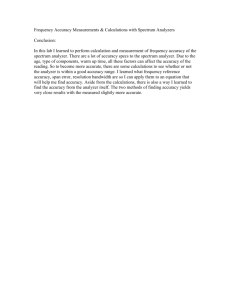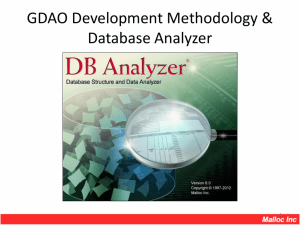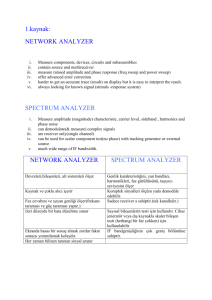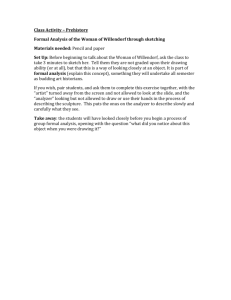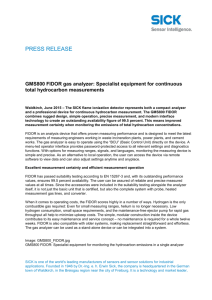Spectrum Analyzers / Network Analyzers
advertisement
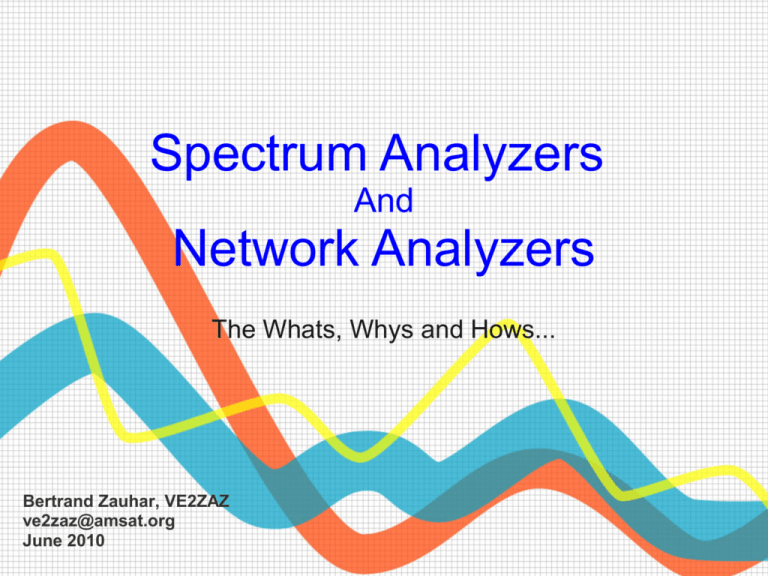
Spectrum Analyzers And Network Analyzers The Whats, Whys and Hows... Bertrand Zauhar, VE2ZAZ ve2zaz@amsat.org June 2010 Today's Program • • • • • • • • Definitions of Spectrum and Network Analyzers, Differences between SNA and VNA, Inner guts of both types of Analyzers, What you get with them, Calibration Kits, Buying one? Example measurements, Measurement of your devices? Spectrum and Network Analyzers • Look somewhat similar – CRT, Knobs, buttons, span, filters, RF input... • Both work in the Frequency Domain – Sweep narrow to wide parts of frequency spectrum – Detect amplitudes and/or phase – Have similar displaying capabilities HP 8560A SA HP 8755A SNA RF Spectrum Analyzer – Definition • An RF spectrum analyzer is a device used to examine the spectral composition of some electrical waveform. It may also measure the power spectrum. Wikipedia • Translation: It is a fast-sweeping tuned radio receiver that displays signal amplitudes at various frequencies. HP 141T SA HP 494AP SA Spectrum Analyzer – Block Diagram Spectrum Analyzer – What you get Analog / Storage CRT Synthesized with u-processor Network Analyzer - Definition • An instrument used to analyze the properties of electrical networks, especially those properties associated with the reflection and transmission of electrical signals known as scattering parameters (Sparameters). Wikipedia • Translation: It is a fast-sweeping tuned or wideband radio receiver that displays relative signal amplitudes (and optionally phases) when compared to a reference at various frequencies. HP 8505A VNA Network Analyzer – Two Types • Scalar Network Analyzer (SNA) – Measures amplitude properties only. Simpler design ($) – Usually requires an external sweeping RF source – May have external RF detectors • Vector Network Analyzer (VNA) – Measures both amplitude and phase properties with greater dynamic range and accuracy. Complex unit ($$$) – Has built-in sweeping RF source (generally) – Has built-in Tuned RF receiver Wiltron 560 SNA HP 8753C VNA Network Analyzer – Block Diagram Network Analyzer – What you get SNA or VNA VNA Vector Network Analyzers • Can display data in various forms Linear Phase with Frequency Polar Plot Smith Chart • Can usually express results in the form of Sparameters directly. – Completely characterize a one-port or two-port linear or passive device VNA Calibration before measurement Amplitude / Phase Detectors = Amplitude / Phase Detectors = Some Calibration Required... • VNAs require performing a “zero” to bring the reference plane at the Device-Under-Test point. • Cal Kits – Short, Open, Termination and Thru. – Expensive!!! • Make your own using good quality connectors, a termination and a bit of imagination... SA can make a good SNA • With addition of Tracking Generator HP 8594A SA HP 70000 SA Buying a Spectrum Analyzer? – Prices vary from ~ hundreds$ to thousands$. – Good for general purpose experimenting and test. For example, required for cavity duplexer adjustment. – CRT Trace Storage capability is a must. – Addition of Tracking generator is a wise move. – It is nice to be able to capture the plots. Need 1980's grade (GP-IB bus). Otherwise take screen pictures. – The HP-141T mainframe SA is good entry point. – Lab-Grade units keep their value. Buying a Network Analyzer? – Classic VNAs are expensive (min. 1000$). Keep their value. – SNA....Better off with SA and Tracking Generator. – Cheaper newer models available (use the computer for display/control). Not as broadband, not as accurate as classic lab-grade VNAs. Require a PC. • MiniVNA, max. 180MHz • N2PK Vector Network Analyzer, max. 60MHz, a kit. • VNA 2180, max. 180MHz – Antenna Analyzers, a possibility...Limited in frequency and measurement range, accuracy, but are small and can be connected up at the antenna feedpoint. • MFJ-269, HF, VHF, UHF • AEA CIA-HF, HF • Autek RF-1, HF only Want more? • Spectrum Analyzer tutorial – http://www.radio-electronics.com/info/t_and_m/spectrum_analyser/rf-analyzer-basicstutorial.php – http:///www.home.agilent.com . • Spectrum Analyzer Basics (AN 150) • Spectrum Analysis Basics: From 1997 Back to Basics Seminar • Network Analyzer tutorial – http://www.radio-electronics.com/info/t_and_m/rf-network-analyzer/analyser-basics-tutorial.php – http:///www.home.agilent.com . • Network Analyzer Basics • Network Analysis Basics - Architecture Of Network Analyzers (AN 1287-2) • Smith Chart Tools (Online Java Applets) – http://www.amanogawa.com/archive/transmissionB.html – http://www.bessernet.com/jobAids/jSmith/jSmith.html Today's Measurements on the VNA • • • • • • Crystal Resonance 1.56GHz Low-Pass Filter HF Lowpass Filter 2.4GHz Helix antenna Tektronix termination Your Device? Today's Measurements on the VNA Using the HP 8753C VNA (0.5MHz to 3000MHz) The Setup Not used for VSWR, S11 or reflection loss Backup Slides Crystal Resonance 1.56GHz Low-Pass Filter HF Low-Pass Filter 2.4GHz Helix Antenna Tektronix 50-Ohm BNC Termination Two Types of Spectrum Analyzers • Swept – – – – – Traditional Heterodyne design. The most popular and least costly Has wider frequency coverage (GHz...) Has limitations in capturing bursty or complex events Provides only amplitude information • Real-Time (Fourier Transform) – RF samples are taken by ADC in the time domain – Fourier Transform and other post-processing (math) is applied to the samples at various frequency bins. – Is much better in capturing complex or fast changing signals – Provides both amplitude and phase info, thanks to FFT – Has frequency range limited by ADC. – More costly The Smith Chart Inductive Reactance Perfect Match Short Capacitive Reactance Open
